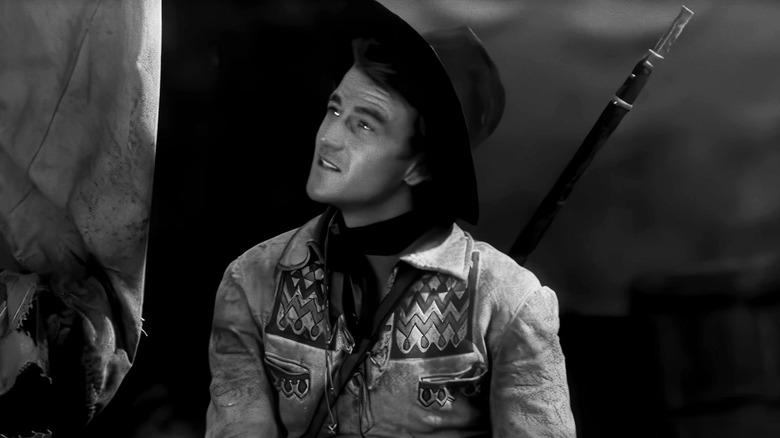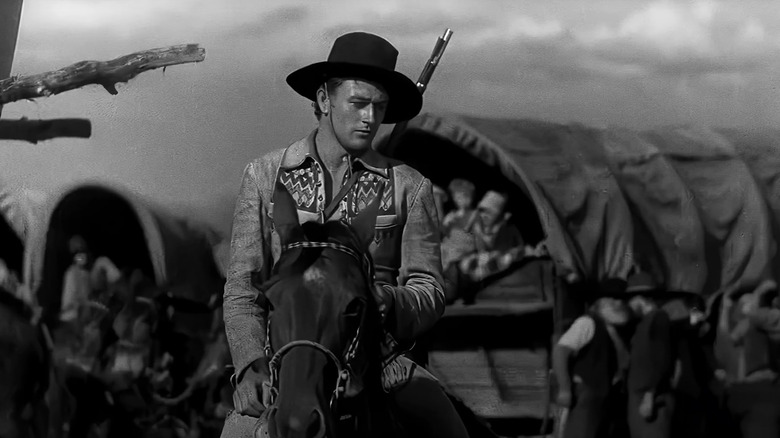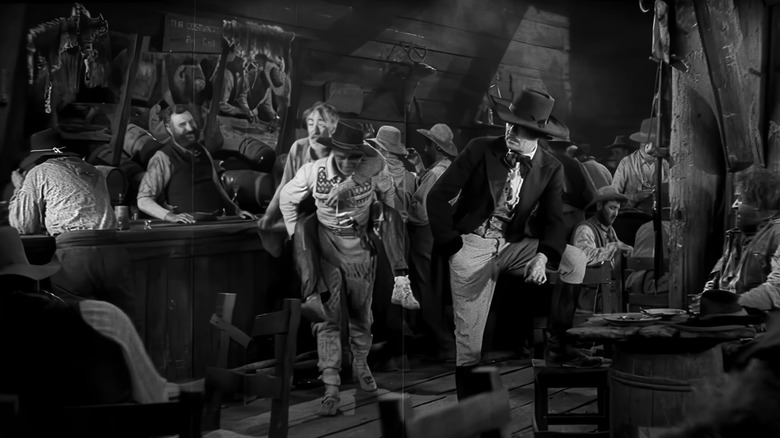John Wayne Was Almost Fired From This Western With 100% On Rotten Tomatoes
When John Ford gave John Wayne his big break with 1939's "Stagecoach," it might have seemed to the masses as if the Duke had come out of nowhere. But Ford actually waited well over a decade to bring Wayne into the big leagues, during which time the young actor cut his teeth in dozens of movies, forging what is in retrospect an impressively prolific pre-fame career in Hollywood.
After "Stagecoach" Wayne, whose real name was Marion Robert Morrison, remained indebted to Ford and always spoke highly of the director despite their often contentious on-set relationship. But the director was not, in fact, the first filmmaker to give Wayne a leading role in a big feature that had the potential to make his career. That honor fell to Raoul Walsh, who cast Wayne in his 1930 widescreen epic "The Big Trail."
The movie was conceived as a celebration of the centennial of the Oregon Trail, and was a grand affair shot in a new 70 mm widescreen format called "Fox Grandeur." It was filmed in seven states and used more than 700 Native American actors as extras, as well as five different casts for the English, Spanish, Italian, French, and German iterations of the movie. At the forefront of this grandiose enterprise was Wayne as fur trapper Breck Coleman, who's tasked with shepherding a group of pioneers and their wagon train across the Oregon Trail. On the way, Breck searches for the men who killed his mentor, and the group facees all manner of setbacks, from a Native American raid to a blizzard and sweltering desert heat. Romance even blossoms when Breck falls for the frontier woman Ruth Cameron (Marguerite Churchill).
Sadly, "The Big Trail" was mostly doomed by cutting-edge camera tech and the Great Depression. The Fox Grandeur format wasn't supported by many theaters, and the film failed to live up to its hype. But it did give Wayne his first starring role and remains one of his most overlooked yet most respected films today, bearing a 100% rating on Rotten Tomatoes. In that sense, it's a good thing Wayne actually managed to make the movie, as at one point he was almost let go from his first leading role.
John Wayne got so sick on The Big Trail he was almost fired
"The Big Trail" might have been a commercial failure at the time of its release in 1930, but it remains a groundbreaking John Wayne Western, even if many have likely never seen it. The film debuted during the years in which Wayne was a relative unknown, and its Fox Grandeur issues only made matters worse. Still, while it might not be cited as frequently as "Stagecoach" or "The Searchers" when discussing Wayne's best films, taking a look at its Rotten Tomatoes page is all you need to do to see that it's one of the actor's most critically praised efforts — even if that 100% rating is based on just nine reviews. What's more, the movie was a major step for the then-young star, who otherwise spent his pre-"Stagecoach" years slumming it in so-called "Poverty Row" Westerns that were churned out on the cheap.
According to the Duke himself, however, he almost missed out on starring in Raoul Walsh's groundbreaking Western. In his infamous 1971 Playboy interview, in which he said some things that haunted him until his death in 1979, Wayne spoke about filming "The Big Trail as one of the times he "really felt like a fool." The actor recalled shooting the picture in Yuma, Arizona, when he was struck by illness. "I was three weeks flat on my back with turistas," he remembered, "or Montezuma's revenge, or the Aztec two-step, whatever you want to call it." According to the actor, he was sick for so long that production came perilously close to recommencing without him. He continued:
"That was the worst case I ever had in my life. I'd been sick for so long that they finally said. 'Jeez, Duke, if you can't get up now, we've got to get somebody else to take your place.' So, with a loss of 18 pounds, I returned to work."
John Wayne was thrown right back into the action on The Big Trail
As controversial as John Wayne became in the years after he told Playboy that Native Americans were being "selfish" for wanting to hold onto their land, you can't ever say he wasn't willing to push himself for his craft. Wayne, who was almost killed on the set of 1928's "Noah's Ark," also suffered numerous injuries throughout his career, breaking ribs and pushing through the pain to make 1973's "The Train Robbers." It seems this willingness to persevere through tough times characterized his career from the very beginning, with Wayne recalling in his Playboy interview how his first scene on "The Big Trail" involved him carrying an actor named Tully Marshall, who was "known to booze it up quite a bit." The actor explained:
"He had a big jug in his hand in this scene, and I set him down, and we have a drink with another guy. They passed the jug to me first, and I dug back into it; it was straight rotgut bootleg whiskey. I'd been puking and crapping blood for a week, and now, I just poured that raw stuff right down my throat. After the scene, you can bet I called him every kind of an old bastard."
Wayne's ability to push through pain stayed with him throughout his career and clearly served him well, even if it did mean he suffered a lifelong injury after tearing some ligaments in his shoulder shooting 1969's "The Undefeated" and pushing ahead with filming anyway. His efforts on "The Big Trail" might not have led to a box office success, but almost a century later, the film is revered as an overlooked classic, so it was all worth it in the end.


